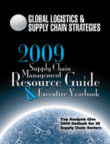
Visit Our Sponsors |
|
|
|
|
|
|
|
|
|
|
|
|
|
|
|
|
|
|
|
|
|
|
|
|
|
|
|
|
|
|
|
|
|
|
|
|
|
|

For most clients, today's supply chain planning market choices look nothing like those when the software was chosen. Software vendors have been acquired, software solutions have evolved, and new players have entered the market. Original software selections were most commonly made by regional teams, and 60 percent of supply chain organizations were regional. As CP company mergers and acquisitions occurred, the CP company finds today that it owns the software rights to many solutions. The switching is driven by three primary reasons:
• Companies Need to Get Better at Planning: In 2008, CP companies experienced record fuel costs and commodity prices. To meet this challenge, it became clear that companies need to do a better job of planning. Working capital reduction is an opportunity. In 2008, while the all-industry average on working capital improved by 8 percent, in consumer products it became worse, costing CP companies 1 percent more in working capital than the year before.
• Enterprise Resource Planning Upgrades: In 2008, 50 percent of CP clients are undertook ERP upgrades. The focus was on common, global instances to support global expansion. This work continues in 2009. Companies are questioning if now is the time to standardize on the SCP ERP offering available as part of the supply chain suite.
• Line of Business (LOB) User Satisfaction: While over 40 percent of LOB users are very satisfied with their primary software providers, 50 percent are somewhat satisfied, and 10 percent are not satisfied. While the IT audience wants a lower cost of ownership and IT consolidation, the LOB user wants usability, functionality and supply chain leadership from their software provider. Good opportunity to discuss the influence of LOB needs.
The Outlook
Despite the desire to evaluate solutions, and CP companies' long experience with SCP and ERP solutions, we find that selection teams are not clear on how to engage with vendors. Specifications are not clear, decision criteria are fuzzy, and many projects end up in political-sometimes "religious"-stand-offs between the LOB and IT organizations.

RELATED CONTENT
RELATED VIDEOS
Timely, incisive articles delivered directly to your inbox.

